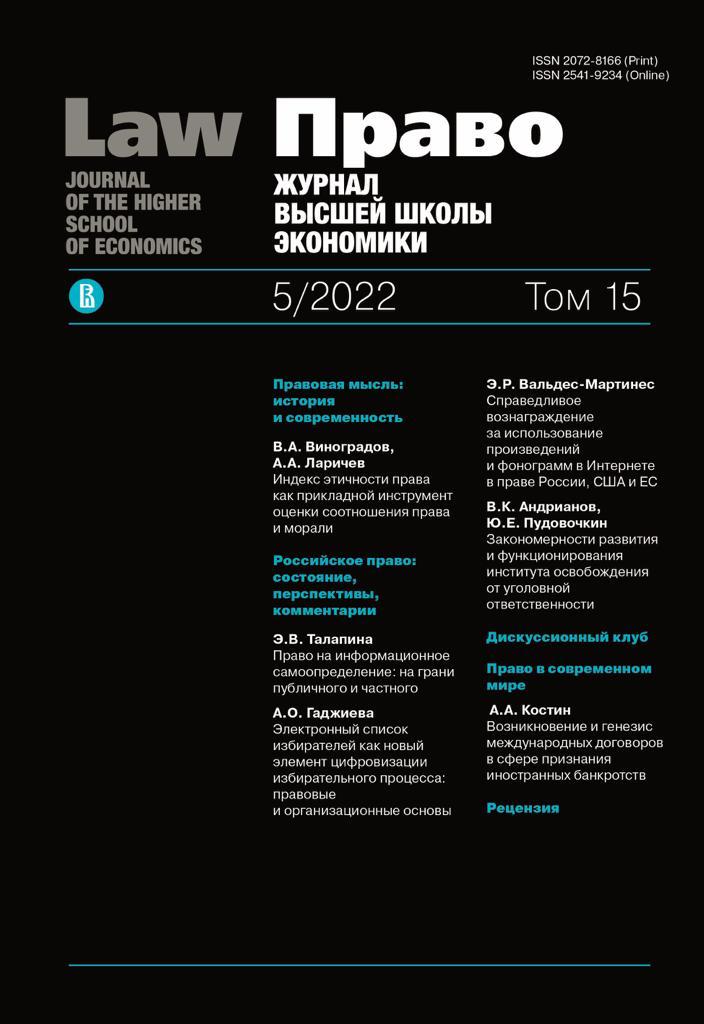Справедливое вознаграждение за использование произведений и фонограмм в Интернете в праве России, США и ЕС
Аннотация
В статье анализируются правовые подходы, касающиеся использования произведений в цифровой среде, в том числе Интернете и порядка выплаты вознаграждения правообладателям. Законы некоторых иностранных государств предусматривают так называемый механизм справедливого вознаграждения. Он заменяет традиционный способ заключения лицензионных договоров и применяется лишь в случаях, установленных законом. Сбор и распределение такого вознаграждения осуществляют организации по управлению правами на коллективной основе (ОКУП). Статья 1244 Гражданского кодекса Российской Федерации определяет сферы, в которых такие организации могут получить государственную аккредитацию. Аккредитация позволяет данным организациям осуществлять сбор вознаграждения за некоторые правомочия, в частности, публичное исполнение, сообщение в эфир или по кабелю музыкальных произведений и/или фонограмм, опубликованных в коммерческих целях для неограниченного числа правообладателей. В 2004 году законодатель закрепил за правообладателями новое правомочие — доведение до всеобщего сведения, известное как Интернет-право. Однако это правомочие сформулировано более узко, чем публичное исполнение, сообщение в эфир или по кабелю, и не входит в число способов, на которые распространяется сфера аккредитации ОКУП. Аккредитованные ОКУП взаимодействуют с традиционными пользователями офлайн, в том числе с театрами, телерадиокомпаниями, кинотеатрами и т.д., которые выплачивают правообладателям вознаграждение за использование музыкальных произведений и фонограмм. В то же время законодательство прямо не указывает на право аккредитованных ОКУП осуществлять сбор вознаграждения с интернет-радиостанций, интернет-телеканалов, онлайн-кинотеатров. Такая правовая неопределенность создает трудности в соблюдении прав правообладателей, в интересах которых действуют аккредитованные ОКУП. В государствах Европейского союза и в США использование произведений и фонограмм в Интернете регулируется иным образом, позволяющим пользователям в ряде случаев выплачивать правообладателям вознаграждение через национальные организации управляющие данными правами на коллективной основе. Вероятно, именно отсутствие прямого регулирования позволяет российским аккредитованным ОКУП осуществлять сбор вознаграждения только за некоторые виды использования произведений и фонограмм в Интернете.
Литература
Bentley L., Sherman B. (2004) Intellectual property law. Saint Petersburg: Juridical Center Press, p. 231 (in Russ.)
Boucher F. (1987) Blanket Music Licensing and Local Television: Historical Accident in Need of Reform. Washington and Lee Law Review, vol. 44, p. 115.
Civil concept of intellectual property in Russian law (2018) M.A. Rozhkova (ed.). Moscow: Statute. SPS Consultant Plus (in Russ.)
Commentary to the Russian Federation Civil Code (2014) Copyright. Copyright related rights. P.V. Krasheninnikov (ed.). Moscow: Statute, 410 p. (in Russ.)
Commentary to the Russian Federation Civil Code (2016) L.A. Trakhtengerts (ed.). Moscow: Norma, 501 p. (in Russ.)
Depreew S. (2014) The variable scope of the exclusive economic rights in copyright. Kluwer Law International, p. 616.
Edwards L. (2010) Role and responsibility of Internet intermediaries in the field of copyright and related rights. Available at: https://www.wipo.int/publications/ru/details.jsp?id=4142&plang=EN (accessed: 24.02.2022)
Eremenko V.I. (2005) Changes in the legislation of the Russian Federation on copyright and related rights. Jurist = Lawyer, no 1. SPS Consultant Plus (in Russ.)
Evgenyeva A.P. (1999) Dictionary of the Russian language. Moscow: Russkyi jazyk, 702 p. (in Russ.)
Fiscor M. (2002) Collective management of copyright and related rights. Geneva: WIPO Press, p. 113.
Frankel S., Gervais D. (2016) Internet and emerging importance of new forms of intellectual property. Wolters Kluwer Law International, p. 217.
Gavrilov E.P. (2005) Commentary on the Law on copyright and related rights. Moscow: Exam, 2005, 210 p. (in Russ.)
Gavrilov E.P. (2005) Issues of copyright and related rights. Ekonomika i pravo = Economy and Law, no. 1. SPS Consultant Plus (in Russ.)
Ginsburg J., Treppoz E. (2015) International copyright law: US and EU perspectives. Cheltenham: Edward Elgar, p. 314.
Kalyatin V.O. (2005) Legal aspects of using work in Internet. Informatcionnoye pravo = Enformation Law, no. 1, pp. 14-18 (in Russ.)
Kalyatin V.O. (2004) Copyright law: use of works on the Internet. Patenty i litcenzii = Patents and licenses, no. 12, p. 3 (in Russ.)
Koo J. (2019) The right of communication to the public in EU copyright law. Oxford: Hart, pp. 58-81. DOI: https://doi.org/10.5040/9781509920686
Lipzig D. (2002) Copyright and related rights. Moscow: UNESCO Press, p. 161 (in Russ.)
McGuigan F. (2015) Making available, communication to the public & user interactivity: An analysis of communication and performing rights application to licensed music streaming services and the subsequent impact on performers. L.: University of Westminster, p. 21.
Morgunova E.A. et al. (2014) Intellectual property law: some issues. Moscow: Norma, 176 p. (in Russ.)
Pogulyaev V.V., Vaipan V.A., Lyubimov A.P. (2006) Commentary on the Russian Federation law on copyright and related rights. Moscow: Justitcinform. SPS Consultant Plus (in Russ.)
Sytenko G.I., Vilinov A.A. (2010) Regulation of relations for the protection of copyright and related rights on the Internet. Kultura: upravlenie, ekonomika, zakon = Culture: Management, Economy, Law, no. 2, pp. 7-11 (in Russ.)
Copyright (c) 2022 Право. Журнал Высшей школы экономики

Это произведение доступно по лицензии Creative Commons «Attribution-ShareAlike» («Атрибуция — На тех же условиях») 4.0 Всемирная.


















